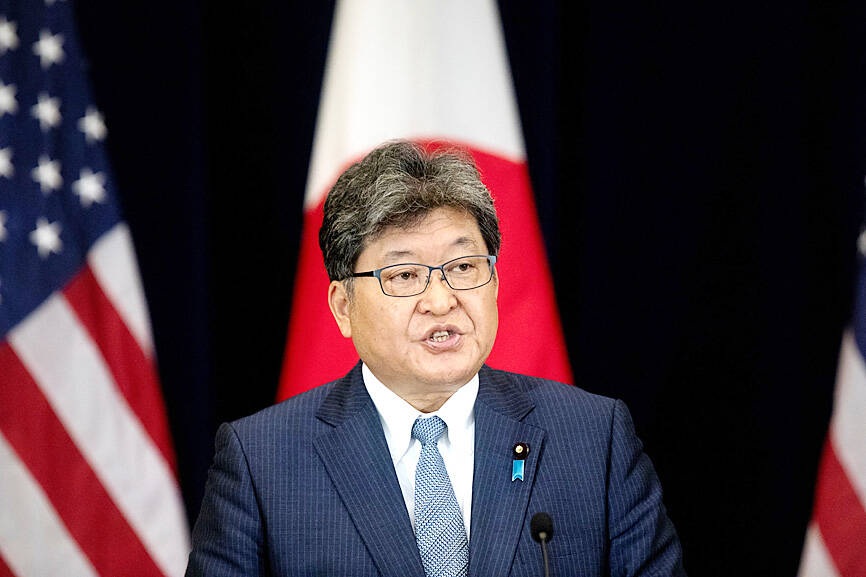President Tsai Ing-wen (蔡英文) pledged on Saturday to deepen security cooperation with Japan to ensure freedom in the Indo-Pacific, during a meeting with a senior member of Japan’s ruling Liberal Democratic Party (LDP).
Although Japan and Taiwan do not have formal diplomatic ties, they have close unofficial relations and share concerns about China, especially its increased military activities near them.
Meeting in the Presidential Office in Taipei, Tsai thanked Japanese Minister of Economy, Trade and Industry Koichi Hagiuda, the LDP’s Policy Research Council chairman, for Japan’s support over issues such as maintaining security in and near the Taiwan Strait.

Photo: Reuters
“We have seen in recent years Taiwan-Japan relations have become ever closer,” Tsai said.
“Taiwan will continue to deepen cooperation with Japan in various fields such as security, and work together to ensure the freedom, openness and stability of the Indo-Pacific region,” she said.
Hagiuda said Taiwan was a good friend to Japan and shares its values.
“Taiwan is an extremely important partner and a valued friend of Japan, with whom Japan shares fundamental values such as liberal democracy, basic human rights and the rule of law, as well as close economic relations and personal exchanges,” Hagiuda said.
“In this context, our help and cooperation with one another has built up over time,” he added.
Hagiuda is in Taipei to attend a forum today on Taiwan-Japan relations, and he told Tsai he would pay his respects at the grave of former president Lee Teng-hui (李登輝).
The Japan-educated Lee, who died two years ago, was dubbed “Mr Democracy” for ending autocratic rule in favor of pluralism.
Japan has expressed growing concern over China’s belligerence toward Taiwan as Beijing seeks to assert sovereignty over the nation.
China staged military drills near Taiwan in August to express anger toward a visit to Taipei by US House of Representatives Speaker Nancy Pelosi, including launching five missiles into the sea close to Okinawa, within Japan’s exclusive economic zone.

Trips for more than 100,000 international and domestic air travelers could be disrupted as China launches a military exercise around Taiwan today, Taiwan’s Civil Aviation Administration (CAA) said yesterday. The exercise could affect nearly 900 flights scheduled to enter the Taipei Flight Information Region (FIR) during the exercise window, it added. A notice issued by the Chinese Civil Aviation Administration showed there would be seven temporary zones around the Taiwan Strait which would be used for live-fire exercises, lasting from 8am to 6pm today. All aircraft are prohibited from entering during exercise, it says. Taipei FIR has 14 international air routes and

The Ministry of National Defense (MND) today released images of the military tracking China’s People's Liberation Army (PLA) movements during the latest round of Chinese drills around Taiwan. The PLA began "Justice Mission 2025" drills today, carrying out live-fire drills, simulated strikes on land and maritime targets, and exercises to blockade the nation's main ports. The exercises are to continue tomorrow, with the PLA announcing sea and air space restrictions for five zones around Taiwan for 10 hours starting from 8:30am. The ministry today released images showing a Chinese J-16 fighter jet tracked by a F-16V Block 20 jet and the

Snow fell on Yushan (Jade Mountain, 玉山) yesterday morning as a continental cold air mass sent temperatures below freezing on Taiwan’s tallest peak, the Central Weather Administration (CWA) said. Snowflakes were seen on Yushan’s north peak from 6:28am to 6:38am, but they did not fully cover the ground and no accumulation was recorded, the CWA said. As of 7:42am, the lowest temperature recorded across Taiwan was minus-5.5°C at Yushan’s Fengkou observatory and minus-4.7°C at the Yushan observatory, CWA data showed. On Hehuanshan (合歡山) in Nantou County, a low of 1.3°C was recorded at 6:39pm, when ice pellets fell at Songsyue Lodge (松雪樓), a

NO SHAME IN RETREAT: Hikers should consider turning back if the weather turns bad or if they do not have sufficient equipment, the Taroko park headquarters said Two people died of hypothermia over the weekend while hiking on Hsuehshan (雪山), prompting park authorities to remind hikers to bring proper equipment and consider their physical condition before setting out in the cold weather. Temperatures dropped over the weekend, bringing snow to high altitudes in Shei-pa National Park. One hiker, surnamed Lin (林), who on Friday was traveling with a group of six along the Hsuehshan west ridge trail, lost consciousness due to hypothermia and died, the Shei-pa National Park Headquarters said. On Saturday, another hiker, surnamed Tien (田), in a group of five on the southeast of the west